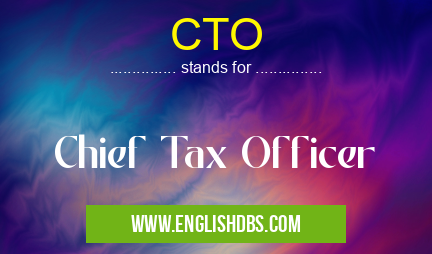What does CTO mean in TAX
CTO stands for Chief Tax Officer. A CTO is a senior-level executive who is responsible for overseeing an organization's tax affairs and ensuring compliance with tax laws and regulations. The CTO is typically responsible for developing and implementing tax strategies, managing tax audits, and representing the organization in tax disputes.

CTO meaning in Tax in Business
CTO mostly used in an acronym Tax in Category Business that means Chief Tax Officer
Shorthand: CTO,
Full Form: Chief Tax Officer
For more information of "Chief Tax Officer", see the section below.
Responsibilities of a CTO
- Developing and implementing tax strategies
- Managing tax audits
- Representing the organization in tax disputes
- Advising on tax implications of business decisions
- Keeping abreast of tax laws and regulations
- Ensuring compliance with tax laws and regulations
- Preparing and filing tax returns
- Managing tax risks
- Training staff on tax matters
Qualifications of a CTO
- A bachelor's degree in accounting, finance, or a related field is typically required.
- A master's degree in taxation or a related field is preferred.
- Experience working in a tax-related field is essential.
- Strong knowledge of tax laws and regulations is required.
- Excellent communication and interpersonal skills are necessary.
Essential Questions and Answers on Chief Tax Officer in "BUSINESS»TAX"
What is a Chief Tax Officer (CTO)?
A Chief Tax Officer (CTO) is a senior executive responsible for overseeing all tax-related matters within an organization. They are responsible for ensuring compliance with tax laws and regulations, minimizing tax liabilities, and providing strategic tax advice to the company's management team.
What are the key responsibilities of a CTO?
Key responsibilities of a CTO include:
- Managing all aspects of tax compliance, including tax planning, preparation, and filing
- Minimizing tax liabilities through legal and ethical tax planning strategies
- Advising the company's management team on tax implications of financial decisions
- Representing the company in tax audits and disputes
- Staying abreast of changes in tax laws and regulations
What are the qualifications for a CTO?
CTOs typically have a bachelor's degree in accounting or finance, as well as a Master's degree in Taxation. They also typically have extensive experience in tax accounting and compliance, as well as strong analytical and problem-solving skills. Most CTOs are certified public accountants (CPAs) and some also hold additional certifications, such as the Certified Tax Advisor (CTA) or the Certified Specialist in Sales and Use Taxation (CSSUT).
What is the difference between a CTO and a Tax Manager?
A CTO is a more senior position than a Tax Manager. CTOs are responsible for the overall tax strategy of the company, while Tax Managers are responsible for implementing and executing that strategy. CTOs also typically have more experience and expertise in tax matters than Tax Managers.
What is the average salary for a CTO?
The average salary for a CTO varies depending on the size and industry of the company, as well as the CTO's experience and qualifications. According to Salary.com, the median salary for a CTO in the United States is $185,000.
Final Words: The CTO is a critical member of the executive team and plays a vital role in ensuring the organization's compliance with tax laws and regulations. The CTO's knowledge and expertise can help the organization save money and avoid costly tax penalties.
CTO also stands for: |
|
| All stands for CTO |
